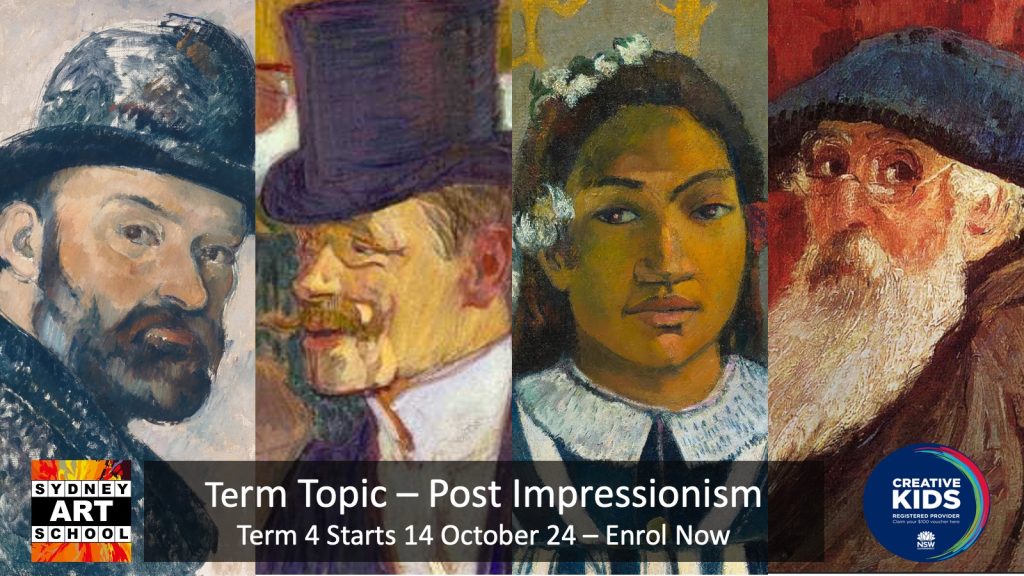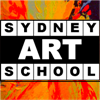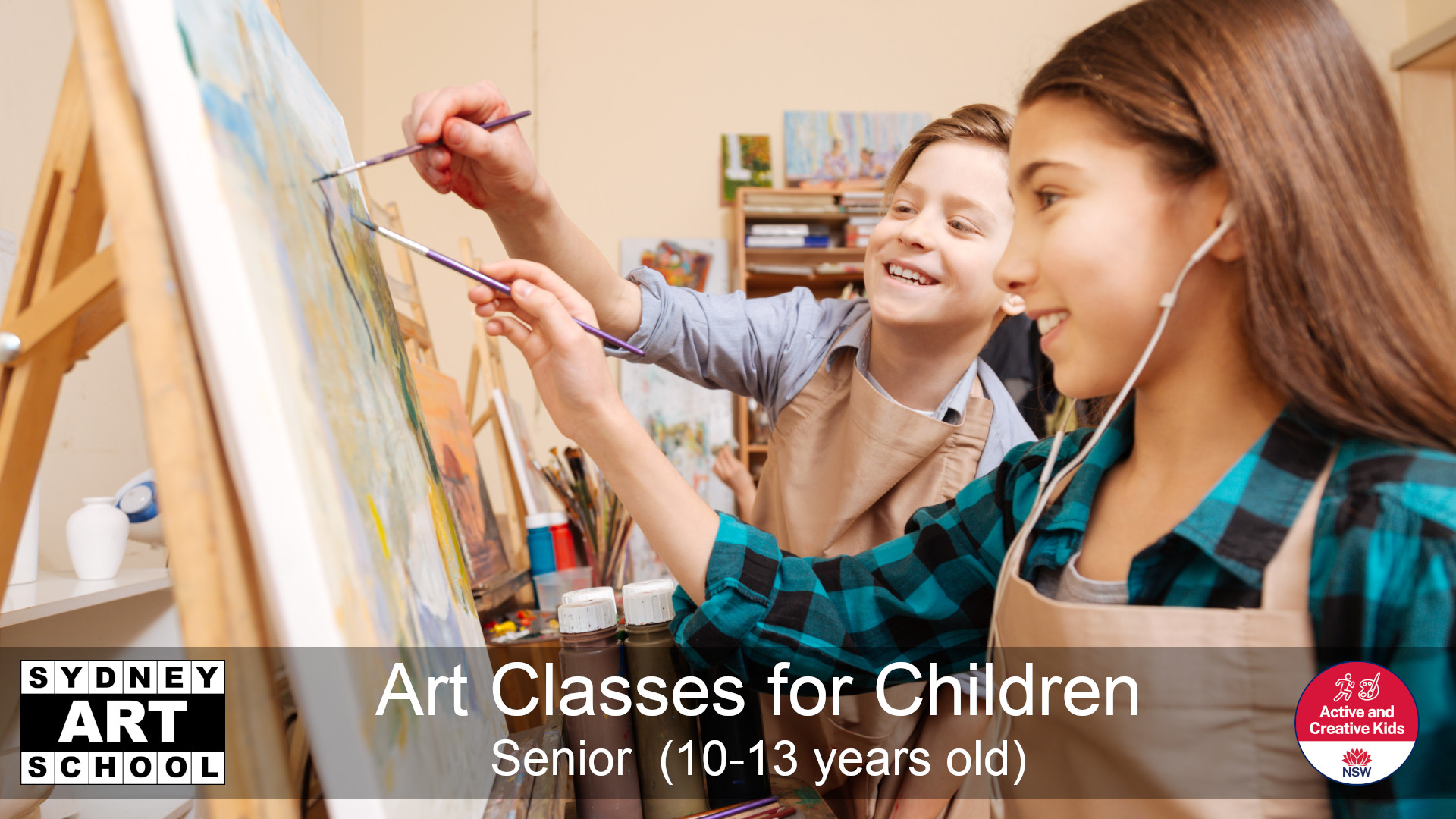Term Topic
Each term, we develop a set of lesson plans based on a new topic to keep your child engaged.
The term topic supports learning of techniques and artistic styles presented in the context of an art movement or famous artist Introducing a fresh topic each term enhances student interest and engagement, accelerating the learning process.
The Topic for Term 4 2024 is Post-Impressionism.
Enrol now for Term 4. Art Classes starts on Monday 14 Oct 2024 and run for 9 weeks.

In Post-Impressionist works, there is often an emphasis on structure and form, with many artists experimenting with geometry, simplified shapes, and unconventional perspectives. This was a shift from the looser, more fluid brushstrokes of the Impressionists, allowing for more deliberate and sometimes abstract compositions. The movement also highlighted the personal vision of each artist. Vincent van Gogh, for instance, used thick, expressive brushstrokes and bold colors to convey his intense emotional states, while Paul Cézanne explored how color and form could be used to depict depth and structure in a way that led to the development of modern art.
Term Topic
Each term, we develop a set of lesson plans based on a new topic to keep your child engaged.
The term topic supports learning of techniques and artistic styles presented in the context of an art movement or famous artist Introducing a fresh topic each term enhances student interest and engagement, accelerating the learning process.
The Topic for Term 4 2024 is Post-Impressionism.
Enrol now for Term 4. Art Classes starts on Monday 14 Oct 2024 and run for 9 weeks.

In Post-Impressionist works, there is often an emphasis on structure and form, with many artists experimenting with geometry, simplified shapes, and unconventional perspectives. This was a shift from the looser, more fluid brushstrokes of the Impressionists, allowing for more deliberate and sometimes abstract compositions. The movement also highlighted the personal vision of each artist. Vincent van Gogh, for instance, used thick, expressive brushstrokes and bold colors to convey his intense emotional states, while Paul Cézanne explored how color and form could be used to depict depth and structure in a way that led to the development of modern art.
What Will Students Do & Learn
The Topic for Term 4 2024 is Post-Impressionism.
Skills Students Will Learn:
- Use of Color for Emotion and Expression: Students will explore how color can be manipulated to express mood and feeling, following the example of artists like van Gogh and Gauguin, who used color symbolically and emotionally.
- Exploration of Composition and Form: Students will learn techniques for organizing space and forms within a painting. Artists like Cézanne introduced geometric shapes and played with perspective, and students will practice simplifying objects into basic forms to explore composition.
- Experimentation with Brushwork and Texture: Post-Impressionist artists employed a wide range of techniques, from van Gogh’s thick, dynamic brushstrokes to Seurat’s precise pointillism. Students will learn different ways to apply paint to create texture, movement, and depth in their work.
- Personal Vision and Symbolism: Unlike the more observational nature of Impressionism, Post-Impressionism encouraged artists to develop a personal style and use symbolism to express deeper meanings. Students will be encouraged to incorporate their own emotional experiences and symbolic elements into their art, reflecting the movement’s focus on individual interpretation.
By studying Post-Impressionism, students gain a deep understanding of how artists transitioned from simply representing the world to conveying their own emotional and psychological responses to it. These skills expand technical proficiency and foster creativity and personal expression in art.
Materials
We recommend students purchase the Sydney Art School Student Resource Kit
OR
You may purchase your own materials separately
The paints in the SAS resource kit are high quality and will typically last a student 3 terms. Contents of the SAS resource kit can be found at …. https://sydneyartschool.com.au/product/resource-kit-acrylics-artist-quality-starter-set-detail/
If you purchase your own materials please ensure they include; Paints: good quality and the same colour set and sizes as the SAS resource kit. 2 tubes of white paint recommended. Brushes: (variety of small, medium and large). Visual Art Diary (A3).
Other items to bring to each class include; Tea towel, washer, paper towel, or cloth: for drying brushes and cleaning spills. Pencil and eraser. Apron, or paint smock Water bottle: please note if coming after school and you bring a snack you may not bring foods containing nuts.
Tutors may ask students to bring in additional items from home such as photographs.
Each term the school will provide; Additional material for major work (canvas, high quality paper). Palettes and water jars are provided in the classroom.
Studios Dates Times
Art classes for kids are available in studios in Hornsby, Baulkham Hills & Epping.
Each term the classes start on the same starting week as NSW Public School Term dates
Classes run for 9 consecutive weeks.
(For classes that fall on a NSW public holidays an additional week will be added to ensure that students receive a total of 9 classes)
| Recommended Age Group Suitability | |||
| Mini Monet | Intermediate | Senior | Senior Transition |
| 5-7 | 8-10 | 11-13 | 13+ |
| Days & Start Date Term 2 – 2024 |
Level | Baulkham Hills |
Epping | Hornsby |
| Mondays
|
Mini Monet | 4:30 – 6:00pm 6:00 – 7:30pm |
4.00 – 5.30pm | 4.30 – 6pm |
| Intermediate | 4:30 – 6:00pm | 4.00 – 5.30pm | 4.30 – 6pm | |
| Senior | 4.00 – 5.30pm | |||
| Senior Transition | ||||
| Tuesdays
|
Mini Monet | 4.30 – 6pm | 4.30 – 6pm | |
| Intermediate | 4.30 – 6pm | |||
| Senior | 5.00 – 6.30pm | 4.30 – 6pm | ||
| Senior Transition | 5.00 – 6.30pm 6.30 – 8.00pm |
5.00 – 6.30pm | ||
| Wednesdays | Mini Monet | 5.30 – 7.00pm | 4.00 – 5.30pm | 4.30 – 6pm |
| Intermediate | 4.00 – 5.30pm | 4.30 – 6pm | ||
| Senior | 4.00 – 5.30pm | 4.30 – 6pm | ||
| Senior Transition | 5:00 – 6:30pm | |||
| Thursdays | Mini Monet | 4.00 – 5:30pm | 4.30 – 6pm | |
| Intermediate | 4:00 – 5:30pm | 4.30 – 6pm | ||
| Senior | 5:30 – 7:00pm | 4.30 – 6pm | ||
| Senior Transition | 5.30 – 7:00pm | 6.30 – 8pm | ||
| Fridays | Mini Monet | 4.00 – 5.30pm
5.30 – 7:00pm |
5.30 – 7pm | |
| Intermediate | 4.00 – 5.30pm
5.30 – 7:00pm |
|||
| Senior | ||||
| Saturdays | Mini Monet |
9.00 – 10.30am
|
9.00am – 10.30am
11am – 12.30pm
|
|
| Intermediate | 11.00 – 12.30pm | 11.00am – 12.30pm | ||
| Senior | 1.00 – 2.30pm | 9.00am – 10.30am
1.00 – 2.30pm |
||
| Senior Transition | 2.45 – 4.15pm | 2.45 – 4.15pm |
Why Sydney Art School?
- Qualified & Professional Tutors
- Structured and Varied Syllabus
- Broad Cognitive Skills Development
- Affordable Value for Money
- A Safe and Secure Environment
Sydney Art School has developed a range of kids art classes that meet those expectations.
Your Children Get The Best Qualified and Professional Art Tutors in Sydney
All senior tutors in childrens art classes are tertiary qualified, and professional artists. They combine full time art tutoring with their personal exhibition schedules.
Students in senior art classes who show high skill levels are invited to attend occasional adult classes and workshops when space permits.
Our extension art students are also given the opportunity to learn from some of Sydney’s best award winning artists including finalists and prizewinners in the Archibald, Sulman, Moran and Dobell art prizes.
An Art Class Syllabus that Combines Structure and Variety Enables Faster Development
To get the most benefit from art classes your child needs to be engaged across a wide area of styles techniques and subject matter.
Subject matter needs to be continually refreshed. If children lose interest the benefits drop away.
Every term a new artistic topic is chosen and lesson plans are created. The artistic topic focuses on a subject type e.g. portraiture, landscape, still life or an art movement such as impressionism, surrealism, cubism.
Variety gives breadth to learning experiences and is an important factors in keeping the students engaged.
Structured lesson plans are developed by our team of artists and teachers with degrees in fine arts and education.
Cognitive Skills Development
Each term topic is supplemented with cognitive skills training exercises specifically designed to strengthen areas such as:
- Visual memory,
- Observation and concentration, and
- Visual processing skills.
Value for Money
We pride ourselves on providing value for money.
An investment in art classes is an investment in the development of your child’s cognitive skills. So it is important that you choose quality and reliability.
Although you can find some classes that cost a little less than Sydney Art School – you will find that this usually means a compromise tutor quality, syllabus breadth and variety, facilities and materials.
Also when you consider the cost of art classes you will find that they are affodable and compare favourably to other activities. A good choice when investing in your child’s development.
Safety Security and Compliance
As a professional organisation the safety and security of your children is of paramount importance to us. We make sure we comply with all government regulations including:
- Working with Children checks: All tutors have certificates provided by NSW Police and and are authorised to work with children.
- First Aid Officers: Each studio has a designated First Aid Officer and most tutors are First Aid trained.
- Public Liability Insurance. Certificate of currency
- Drop Off – Pick Up Policy: All students are required to be escorted to the tutor, the tutor will supervise untill pick up by the parents.
- Visitor Policy: Visitors to studios are only permitted if prior arrangement is made with Sydney Art School. Tutors will be notified via email to expect the visitor – otherwise they will not be allowed to enter the premises.
General Information
Terms of Service https://sydneyartschool.com.au/about-us/terms-and-conditions


